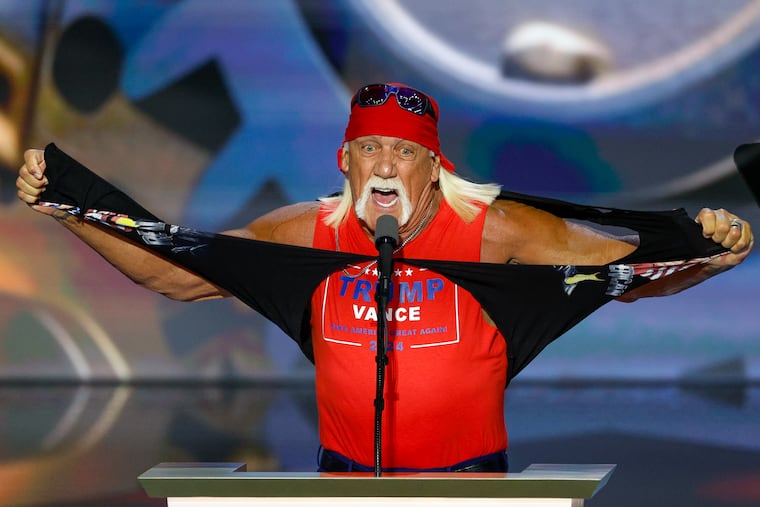How should men behave? Americans can’t seem to agree.
Three in 10 Republican men believe the gains women have made in society came at the expense of men. Most Americans don’t.

Both presidential campaigns this year have attempted to stake out what makes a man, whether that looks like retired wrestler Hulk Hogan tearing off his shirt while shouting “Let Trumpamania run wild, brother!” at the Republican National Convention, or vice presidential nominee Tim Walz describing his family’s struggle with infertility while his son wept at the Democratic National Convention. It is an area, similar to the economy and the border, where the campaigns and their surrogates are actively fighting over their competing visions for the country.
In September, Pew Research Center set out to gauge how the American public is grappling with male behavior and gendered progress, asking more than 6,000 U.S. adults about men and masculinity.
The report, released Oct. 17, reveals that Republican men claim starkly different views than Republican women when asked if men are better off than they were 20 years ago; that younger generations think far more flexibly about masculinity; and that across party lines, a majority of Americans believe men who are “open about their emotions” and “caring” are underappreciated.
“Honestly, we tend to focus on women, because that’s where a lot of the change has been,” said Kim Parker, director of Pew’s social trends research. “We’ve never really gone in and asked this many questions about what it means to be a man.”
In this moment of profound national conflict over how men should behave and what kind of progress we’ve made as a country, here are the most interesting takeaways from the October report:
1. Republican men stand out for their views
While a majority of Americans don’t believe that the gains women have made in society came at the expense of men, the October survey found that three in 10 Republican men do believe so — a far greater share than Republican women (16%), Democratic men (16%), or Democratic women (9%) who think so. Republican men are also more likely to say that men are doing worse, compared to 20 years ago, when it comes to getting leadership positions in the workplace, getting well-paying jobs, and getting into college.
“They tend to see things a little more as a zero-sum game than other groups do,” Parker said.
Overall, Republican men are more likely to identify as “highly masculine” (53%) and to believe that Americans have negative views of masculine men (45%).
2. People under 30 think it’s fine for men to care about fashion
The researchers asked Americans what they thought about a range of male behavior, from putting “a lot of effort into their style and fashion choices,” to playing video games, to throwing a punch if provoked. Respondents were asked to rank the behaviors from extremely acceptable to not at all acceptable.
Young adults were far more likely than their older peers to say that fashion effort was highly acceptable for men — nearly 60% of adults under age 30 said so, compared to only 32% of adults over 50. (Another age gap shows up around men taking their wife’s last name upon marriage, which 65% of older Americans say is totally unacceptable, compared to 36% of young adults.)
Men under 30 were much less likely to identify as “highly masculine” than their older peers, in line with other recent national surveys showing nearly a third of young people identify as lesbian, gay, bisexual, transgender, or queer.
3. Nearly half the public believes mothers are fundamentally better at managing children’s schedules
Large majorities believe that in families where a father and a mother are raising children, the parents are equally good at helping kids with schoolwork, teaching moral values, and playing with the kids.
But the public is less sure that fathers and mothers are equally good at managing children’s schedules. Forty eight percent think fathers and mothers would do the task equally well. Forty nine percent believe mothers would be better at it.
“This echoes the work we’ve done on parenting in the past. A substantial share think a mother is going to do better at certain aspects of parenting,” Parker said.
That belief seems to play out in households across the country: a recent analysis from the Gender Equity Policy Institute found that mothers spend more than twice as much time on childcare and household care than fathers do.
4. Everyone agrees dating today is terrible
When it comes to relationships and well-being, Americans generally agree that men and women are both doing better when it comes to work-life balance and getting emotional support than they were 20 years ago. In contrast, when it comes to finding a romantic partner, Americans agree that things have gotten worse for both men and women.
That makes sense, considering the very large industry that has sprung up to help people meet their matches online, offline, with a billboard, with a PowerPoint.
Maybe the presidential candidates should be addressing the romance crisis.